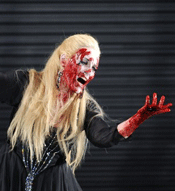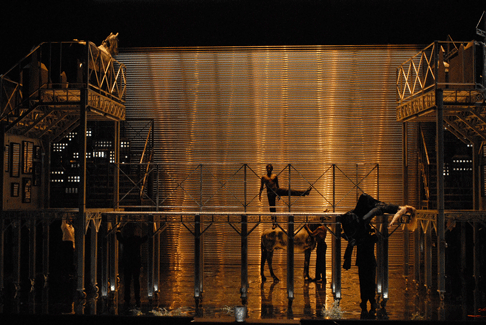
19 Jul 2009
Mozart Mistreated at Aix-en-Provence Festival
At the festival of Aix-en-Provence, now in its sixty-first year, the final installment of Wagner’s “Ring,” with Simon Rattle and the Berlin Philharmonic, has hogged the spotlight.
English Touring Opera are delighted to announce a season of lyric monodramas to tour nationally from October to December. The season features music for solo singer and piano by Argento, Britten, Tippett and Shostakovich with a bold and inventive approach to making opera during social distancing.
This tenth of ten Live from London concerts was in fact a recorded live performance from California. It was no less enjoyable for that, and it was also uplifting to learn that this wasn’t in fact the ‘last’ LfL event that we will be able to enjoy, courtesy of VOCES8 and their fellow vocal ensembles (more below …).
Ever since Wigmore Hall announced their superb series of autumn concerts, all streamed live and available free of charge, I’d been looking forward to this song recital by Ian Bostridge and Imogen Cooper.
The Sixteen continues its exploration of Henry Purcell’s Welcome Songs for Charles II. As with Robert King’s pioneering Purcell series begun over thirty years ago for Hyperion, Harry Christophers is recording two Welcome Songs per disc.
Although Stile Antico’s programme article for their Live from London recital introduced their selection from the many treasures of the English Renaissance in the context of the theological debates and upheavals of the Tudor and Elizabethan years, their performance was more evocative of private chamber music than of public liturgy.
In February this year, Albanian soprano Ermonela Jaho made a highly lauded debut recital at Wigmore Hall - a concert which both celebrated Opera Rara’s 50th anniversary and honoured the career of the Italian soprano Rosina Storchio (1872-1945), the star of verismo who created the title roles in Leoncavallo’s La bohème and Zazà, Mascagni’s Lodoletta and Puccini’s Madama Butterfly.
Evidently, face masks don’t stifle appreciative “Bravo!”s. And, reducing audience numbers doesn’t lower the volume of such acclamations. For, the audience at Wigmore Hall gave soprano Elizabeth Llewellyn and pianist Simon Lepper a greatly deserved warm reception and hearty response following this lunchtime recital of late-Romantic song.
Collapsology. Or, perhaps we should use the French word ‘Collapsologie’ because this is a transdisciplinary idea pretty much advocated by a series of French theorists - and apparently, mostly French theorists. It in essence focuses on the imminent collapse of modern society and all its layers - a series of escalating crises on a global scale: environmental, economic, geopolitical, governmental; the list is extensive.
For this week’s Live from London vocal recital we moved from the home of VOCES8, St Anne and St Agnes in the City of London, to Kings Place, where The Sixteen - who have been associate artists at the venue for some time - presented a programme of music and words bound together by the theme of ‘reflection’.
'Such is your divine Disposation that both you excellently understand, and royally entertaine the Exercise of Musicke.’
Amongst an avalanche of new Mahler recordings appearing at the moment (Das Lied von der Erde seems to be the most favoured, with three) this 1991 Mahler Second from the 2nd Kassel MahlerFest is one of the more interesting releases.
‘And there was war in heaven: Michael and his angels fought against the dragon; and the dragon fought and his angels, And prevailed not; neither was their place found any more in heaven … that old serpent … Satan, which deceiveth the whole world: he was cast out into the earth, and his angels were cast out with him.’
If there is one myth, it seems believed by some people today, that probably needs shattering it is that post-war recordings or performances of Wagner operas were always of exceptional quality. This 1949 Hamburg Tristan und Isolde is one of those recordings - though quite who is to blame for its many problems takes quite some unearthing.
There was never any doubt that the fifth of the twelve Met Stars Live in Concert broadcasts was going to be a palpably intense and vivid event, as well as a musically stunning and theatrically enervating experience.
‘Love’ was the theme for this Live from London performance by Apollo5. Given the complexity and diversity of that human emotion, and Apollo5’s reputation for versatility and diverse repertoire, ranging from Renaissance choral music to jazz, from contemporary classical works to popular song, it was no surprise that their programme spanned 500 years and several musical styles.
The Academy of St Martin in the Fields have titled their autumn series of eight concerts - which are taking place at 5pm and 7.30pm on two Saturdays each month at their home venue in Trafalgar Square, and being filmed for streaming the following Thursday - ‘re:connect’.
The London Symphony Orchestra opened their Autumn 2020 season with a homage to Oliver Knussen, who died at the age of 66 in July 2018. The programme traced a national musical lineage through the twentieth century, from Britten to Knussen, on to Mark-Anthony Turnage, and entwining the LSO and Rattle too.
With the Live from London digital vocal festival entering the second half of the series, the festival’s host, VOCES8, returned to their home at St Annes and St Agnes in the City of London to present a sequence of ‘Choral Dances’ - vocal music inspired by dance, embracing diverse genres from the Renaissance madrigal to swing jazz.
Just a few unison string wriggles from the opening of Mozart’s overture to Le nozze di Figaro are enough to make any opera-lover perch on the edge of their seat, in excited anticipation of the drama in music to come, so there could be no other curtain-raiser for this Gala Concert at the Royal Opera House, the latest instalment from ‘their House’ to ‘our houses’.
"Before the ending of the day, creator of all things, we pray that, with your accustomed mercy, you may watch over us."

At the festival of Aix-en-Provence, now in its sixty-first year, the final installment of Wagner’s “Ring,” with Simon Rattle and the Berlin Philharmonic, has hogged the spotlight.
Nevertheless, Mozart has always been the core of the Festival repertory and the new production of “Idomeneo” did look good on paper. The opera has 6 performances, from July 4 through 17, in the traditional venue, the courtyard of the Archbishop’s palace in Aix.
Director Olivier Py has been heaped with praise for his work with Geneva’s opera for the past several years. Recently appointed to head the top Odéon–Théâtre de l’Europe in Paris (where the great Giorgio Strehler did much of his best work) he seemed a theater god who could do no wrong. This lumpy, limping production, however, suggests a serious case of clay feet.
First seen on stage are well-dressed African boat people (the Trojan prisoners in the libretto) who are menaced by AK-47 men in black for no particular reason. The story-telling did not improve later. Using massive amounts of structural steel, one critic commented that it was like Mozart meeting Gustav Eiffel. Actually, it was Eiffel who consistently demonstrated how light and graceful steel structures could be. Py’s “heavy metal” approach was oppressive to to the eye and garishly lit. The ungainly sections were on wheels and, during duets, couples were compelled to sing while ascend stairs and open doors of the twirling sections, all the while negotiating Mozartian rapids. The usually-cut ballet sequences (there was no choreographer credited in the program) had half-naked young men camping it up when they were not pretending to dismember each other and it reminding this writer of Madonna’s back-up dancers on tour.
Vocally, it is not promising when the singer with a real feel for the Mozartian style is the Arbace. Very impressive here, young Xavier Mas is clearly one to track. In the title role, tenor Richard Croft (Mozart’s 1789 tenor version was used) had often fine moments and his “Fuor del mar” was well received. Strain, however, was always apparent when the music went “forte” and beyond. French tenor Yann Beuron, as Idamante, has had his voice fill out and thicken these past years and, while still lovely, it no longer has easily agility. The talented Belgian soprano Sophie Karthäuser impressed as Ilia but, as with the decor, less steel would have been better.
When the grand Mireille Delunsch first descended the staircase as Elettra there was an electricity in her voice that demanded attention. But, reaching stage level and directorial requirements — silent-screen gesticulations that would have embarrassed Theda Bara — all hope of a definitive character disappeared. Later, during her final scene, there actually was a bucket of blood and she went ahead with the sponge bath, putting to rest the French idea of “du trop.” The Neptune — almost always on stage waiving his trident — was wearing what appeared to be a bargain Halloween costume from Woolworths.
 A scene from Idomeneo [Photo by E. Carrechio courtesy of Festival d'Aix-en-Provence
A scene from Idomeneo [Photo by E. Carrechio courtesy of Festival d'Aix-en-Provence
The singing, while not up to highest festival standards, served the music and Marc Minkowski and his Musiciens du Louvre-Grenoble contributed a strong orchestral underpinning with their traditional gusto. A few orchestral sour notes could be attributed to the changing humidity as night falls — a traditional problem with outdoor concerts. This opera of the 25 year-old composer has been receiving much attention in recent years with, as only one example, a fine new production of Luc Bondy at the Paris Opera. The Aix production, broadcast throughout Europe on the night I saw it, July 10, is not likely to induce a flood of ticket request for next season. This is an extraordinary opera and a cumbersome staging does not show the music to best advantage.
Frank Cadenhead
This article first appeared in La Scena Musicale. It is reprinted with the permission of the author.